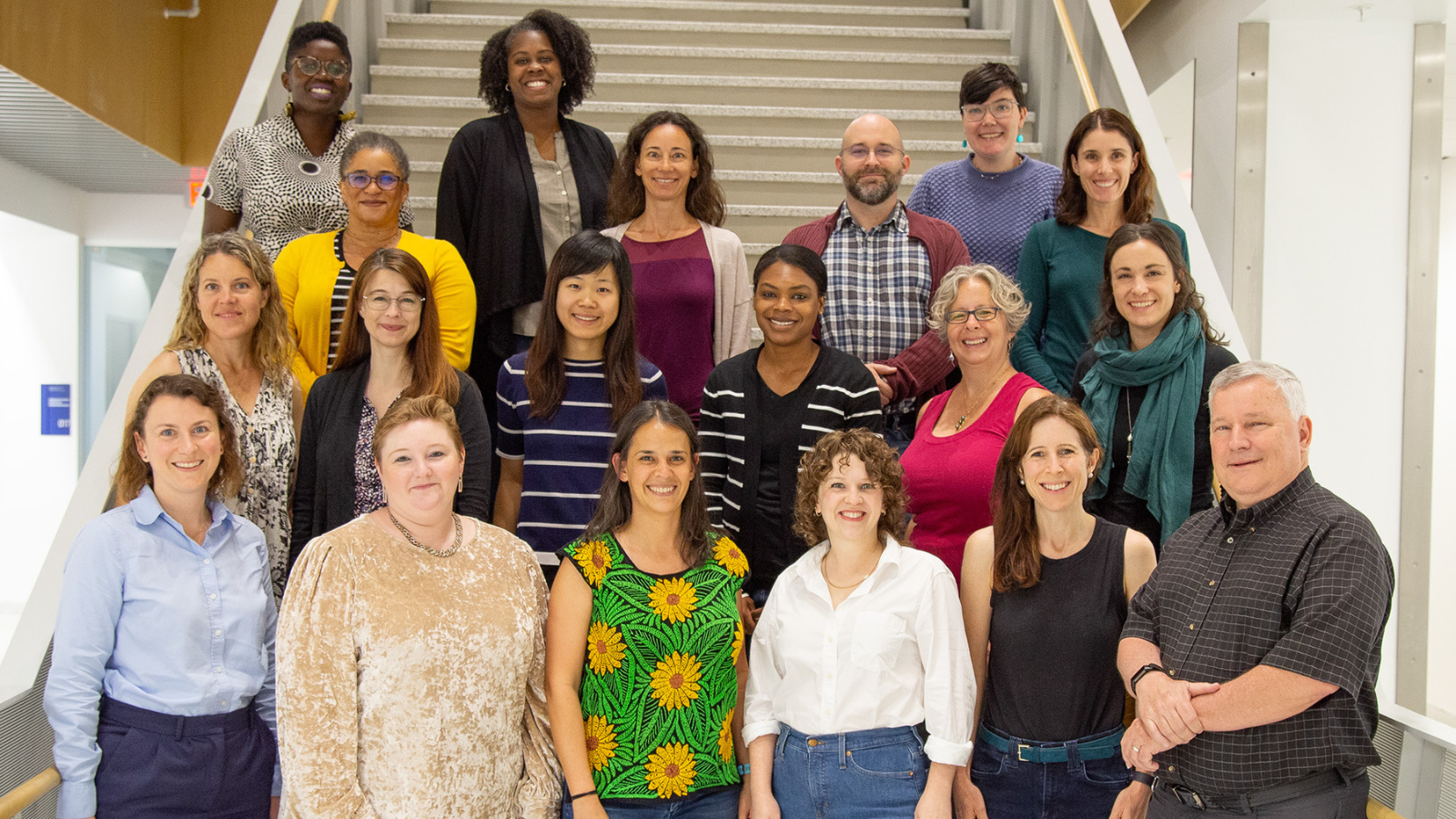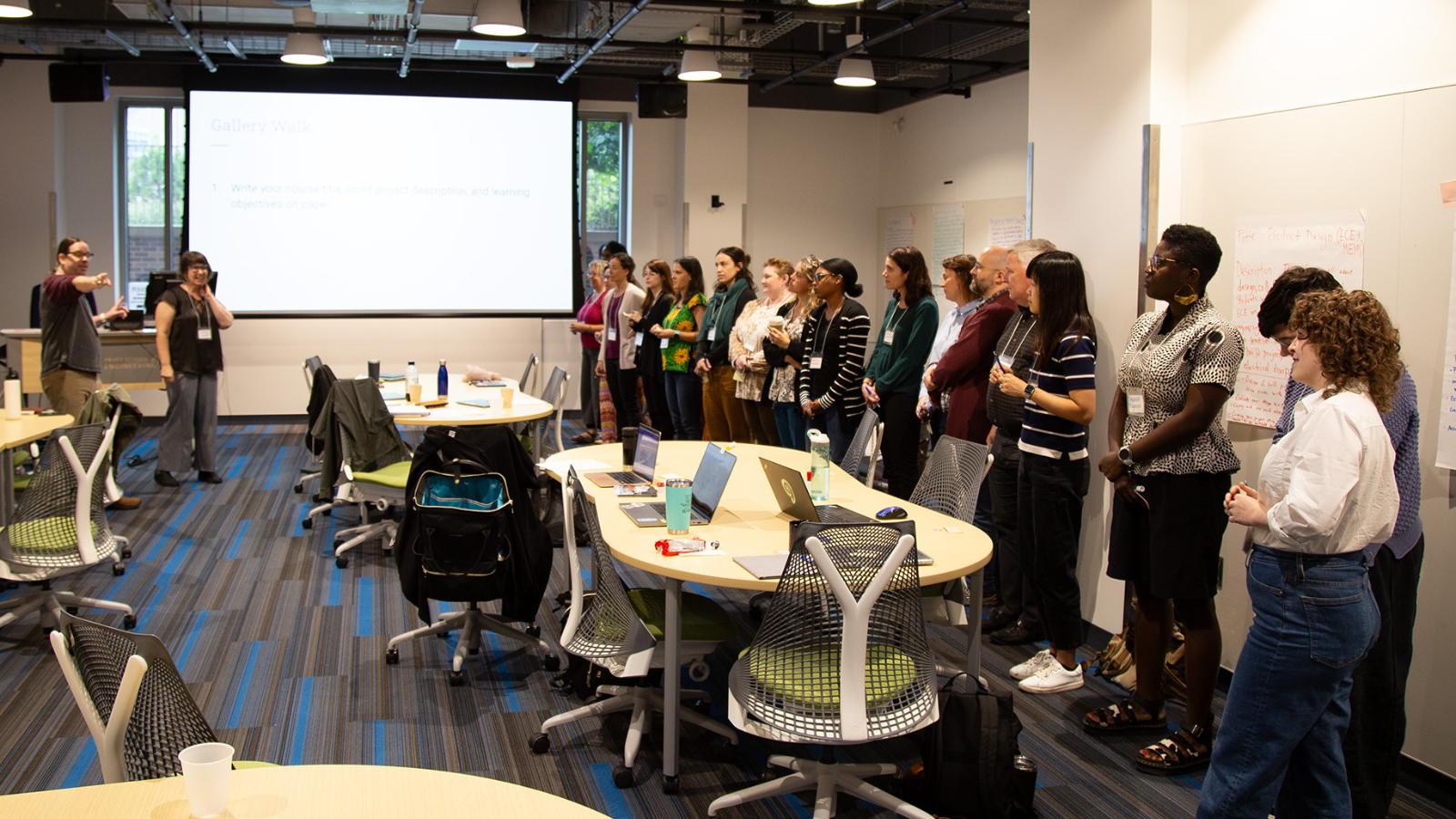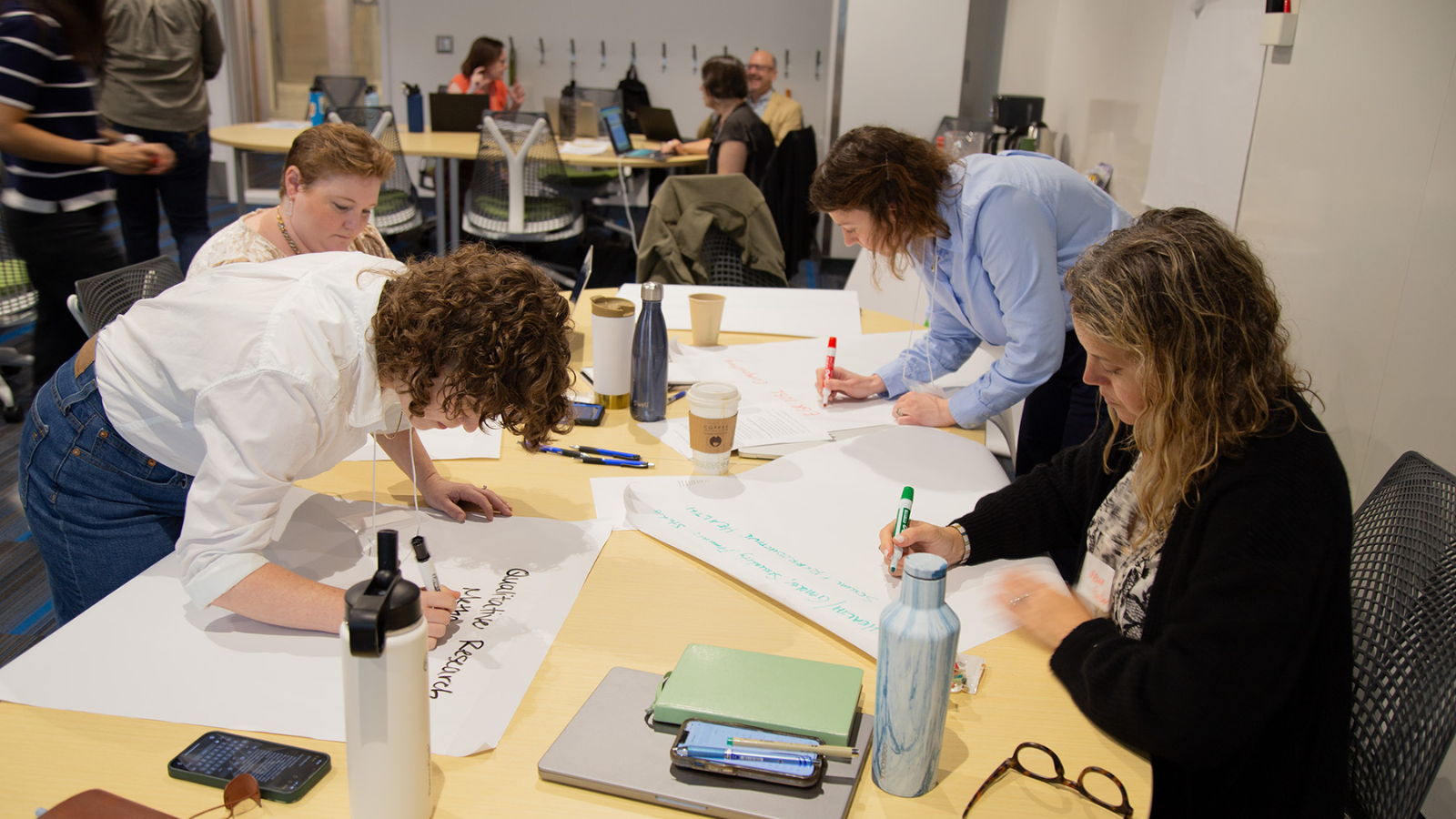Meet the 2024 Collaborative Project Courses Faculty Fellows
May 20, 2024

Learning Innovation & Lifetime Education and Bass Connections are pleased to welcome the third cohort of Collaborative Project Courses Faculty Fellows. The Collaborative Project Courses Faculty Fellows Program, which kicked off on May 13 with three days of intensive, in-person workshops, supports faculty interested in designing courses in which student learning is driven by collaborative research on applied projects that extend across an entire semester.
This year’s cohort includes 19 faculty affiliated with five Duke schools, two university institutes and North Carolina Central University. Participants will reimagine an existing course, or design a course from scratch, in which students will work on teams to create new knowledge, tangible works and/or creative or artistic projects. Courses under development include five graduate-level courses and 11 undergraduate courses. Course (re)design will be facilitated through intensive workshops and collaborations between fellows, with support and guidance from faculty and experts in teaching and pedagogy.
Topics covered in the fellowship include developing learning objectives and designing a course syllabus; choosing and scoping projects; creating course and project milestones; identifying project partners and/or clients; creating, leading and mentoring student teams; and assessing collaborative work.

2024 Faculty Fellows
Tyler Bletsch (Electrical & Computer Engineering) &
Rebecca Simmons (Mechanical Engineering & Materials Science)
ECE 495: Product Design
Bletsch and Simmons are collaborating to enhance their existing Product Design course in which students work in vertically integrated teams to design, build and test smart devices. The course is aimed at helping students learn techniques for uncovering problems and improving the originality and flexibility of their idea generation process. Graduate students in the Masters of Engineering Management program are paired with undergraduate students in Mechanical Engineering & Materials Science to learn foundational skills for creating, managing, building, testing and executing ideas by providing a hands-on team-based building experience that stimulates innovation, enhances creativity, encourages risk-taking and allows students to practice communication and build creative confidence.
Jessica Corey (Thompson Writing Program)
WRITING 101: Narrating Medicine: From Medical Research to Patient Experiences
Corey is designing a new Writing 101 course that will examine individual and collective experiences with medicine (e.g., medical research, physician training, patient experiences) through an interdisciplinary lens. Students will explore how subjective experience and “objective” inquiry inform medical practices and policies; how historical and current social structures determine how meaning is derived from certain forms and representations of knowledge; and what the future of medicine could look like if it adopts a narrative form. In the course, students work in small groups to examine narrative case studies related to medical experiences, illness or healthcare encounters. The groups then use the case study to collaboratively generate a research question, conduct additional research and write a report that synthesizes the primary (narrative) and secondary sources. Students also collaborate to create narrative maps that visually represent the journey of a patient or healthcare provider through illness, treatment, caregiving or policy creation/implementation. Ultimately, the goal is for students to understand writing as a social practice from both a theoretical and practical perspective.
Kisha Daniels (Education) &
Yolanda Dunston (Education, North Carolina Central University)
Undergraduate seminar in Education (Course number and title TBD)
Daniels and Dunston will codesign and coteach a new course examining the stereotypes, narratives and counter-narratives of the work of African American women focusing particularly on their role in primary and secondary education systems. The course will center the voices, perspectives and experiences of African American women in Durham Public Schools to help students explore relationships and look for connections between aspects of identity (e.g., race, social class, gender) and labor. Students will engage in service learning and research with local organizations (e.g., Durham Public Schools, Office of Equity Affairs, The Dudley Flood Center for Education Equity and Opportunity) to support their frameworks for success and efforts to increase diversity in the educator pool. In research teams, students will use literature reviews, interviews and/or archival materials to uncover interesting case studies. They will then collaborate to synthesize information, determine the most effective methods for communicating findings, and use digital tools to create and share multimedia projects.

Meagan Dunphy-Daly (Marine Science & Conservation)
MARSCI 205/ENV 205/BIO 205: Marine Megafauna
Dunphy-Daly is redesigning her introductory-level Marine Megafauna course, which introduces students to marine ecology and conservation through the ocean’s largest inhabitants. Using marine megafauna examples, students examine the ocean environment, evolution, life history strategies, methodological approaches and technologies for studying marine ecosystems and marine biodiversity. Students explore the interdisciplinary nature of marine conservation and how science and research, societal and cultural values, and law and policy play a role in marine conservation and management. In the course, students work in teams to develop a blog post and in-class presentation as well as a final video project that communicates a current marine megafauna conservation or management issue to the public.
Laura Florand (Romance Studies)
FRENCH 301: Finding Your Voice
Florand is enhancing her upper-level French language course focused on advanced writing. In addition to gaining competences in self-expression through creative and analytical writing in French, students in this course will develop a French-language writing contest for youth in rural villages in Togo. In collaboration with Ahead Togo as well as returning and outgoing Duke Engage Togo students, students in the course will develop age-appropriate writing subjects, establish contest criteria, evaluate submissions, determine first- to third-place winners and write prize-specific speeches to honor award recipients. Students will be trained in creating international connections through writing and will gain sensitivity to the challenges of second-language writing in postcolonial contexts.
Megan Huchko (Global Health and Obstetrics & Gynecology)
GLHLTH 215/GSF 212: Global Sexual and Reproductive Health
Huchko is redesigning an introductory-level course that engages students in the examination of the field of global sexual and reproductive health. Students explore how social determinants of health impact reproductive and sexual health around the globe; evaluate how disparities in sexual and reproductive health are measured; learn about interventions to address these health disparities and evaluate their effectiveness; and practice proposing interventions. Students work in teams to research health outcomes, identify the drivers of these outcomes, see how these drivers can be impacted through various interventions and propose their own solutions.
Erin Johnston (Sociology)
SOCIOL 490: Religion and Health
Johnston is developing a new course that will focus on research at the intersection of religion and health. Students will read and review the latest research on how religion shapes individual health and how religion intersects with healthcare and health policy at the collective level, and they will work in teams to interview practitioners and/or patients about the role of religion and faith in their professional and personal lives. Students in the course will gain teamwork and social science research skills, including research design, qualitative and/or quantitative data collection, data analysis, presentation of research findings and academic writing.
Genevieve Lipp (Electrical & Computer Engineering)
EGR 105L: Computing for Engineers
Lipp is redesigning the core computing course for engineering undergraduates. This course explores computational thinking and programming to solve engineering problems. By the end of the course, students should be able to devise and implement an algorithm to address a computational engineering problem using expert tools and systematic testing and debugging. Throughout the course, student teams tackle projects inspired by engineering industry and research. Ideally, the projects will include industry partners who “sponsor” the projects by providing their knowledge of the domain and sample data. Ultimately, students in the course will gain computing self-efficacy, fundamental programming skills, and a sense of engineering identity and community.
Shelley Liu (Public Policy)
PUBPOL 763: Introduction to Peace and Conflict Resolution
Liu is redesigning a course on peace building and conflict resolution for first-year students in the Master of International Development Policy program. In the course, students will examine peace as more than just the absence of conflict but as positive action towards change, justice and well-being. Students will analyze theories, models and real-world examples of peace building and gain insights into how peace can be developed at the individual, community, national and international levels. Students will also work together in teams to create a peace building intervention plan for a specific conflict-affected area, requiring them to analyze conflict dynamics, identify root causes and propose innovative strategies for fostering peace within different arenas.
Patrick Morrison (Financial Technology)
FINTECH 512: Software Engineering for Financial Technology
Morrison is updating his Software Engineering for Financial Technology course, which is a core requirement for the financial technology professional master’s degree. Students in the course learn key software engineering principles and practices and learn how to develop software systems for handling financial assets, including through collaborative software development projects.
Siobhan Oca (Mechanical Engineering & Materials Science)
ME 555: Medical Robotics
Oca is enhancing a project-based course in medical robotics and surgical technologies, which is designed for first-year doctoral students and second-year master’s students in engineering. Students in the course work in teams to examine a surgical and/or medical technology issue and then propose a solution and draft a research plan to address that issue. Through the course, students practice developing experimental plans, performing literature reviews, communicating results and performing experiments with physical robotic systems.

Sandra Sotelo-Miller (Thompson Writing Program) &
Susan Thananopavarn (Thompson Writing Program)
Asian American and Latinx Literature and Film (Course number TBD)
Sotelo-Miller and Thananopavarn are codesigning and will coteach a new course that examines Asian American and Latinx cultural productions, emphasizing the connections that exist between these communities’ diasporic histories and the common questions and issues that concern many of their writers, directors and other artists. In addition to exploring issues of post-colonialism, citizenship, language, migration, race, and gender and sexuality, students in the course will engage in a semester-long research project that culminates in the creation of a public facing digital exhibit intended as a resource for fellow college students and K-12 teachers.
Maria Tackett (Statistical Science)
STA 221: Regression Analysis: Theory and Applications
Tackett is developing a new course in which undergraduate students will learn foundational skills in statistical modeling, with a focus on linear and logistic regression. In the course, students will investigate how to estimate, assess and interpret statistical models as they use them to understand relationships between variables in complex data. Throughout the course, students will work in teams to apply what they’ve learned in an open-ended data analysis project using regression to answer questions about real-world phenomena and explain the mathematics behind the modeling methods.
Rebecca Vidra (Marine Science & Conservation)
ENVIRON 617: Restoration Ecology
Vidra is developing a new course that will provide a broad overview of the field and process of ecological restoration. Student teams will connect with local conservation organizations and (possibly) private landowners to develop preliminary restoration plans to suit their needs. Students will complete site inspections, conduct a search for potential funding opportunities and regulatory hurdles, engage with stakeholders to define potential goals for the project and outline a restoration process from the start through to monitoring for success. Overall, the course and the semester-long project will give students real-world experience in restoration planning while providing actionable plans for community partners.
Noelle Wyman Roth (Environmental Social Sciences)
ENVIRON 658: Qualitative Research Methods
Wyman-Roth is enhancing her graduate-level Qualitative Research Methods course which teaches students how to design, collect and analyze qualitative data by conducting original research on an environmental topic. The primary assignment in the course is a semester-long research project on an applied environmental question. Small teams of students work together (sometimes in partnership with a client or community partner) on all aspects of the research process including defining their research question; developing a research plan; collecting, analyzing and interpreting data; and communicating findings.
Alexandra Zagbayou (Public Policy)
PUBPOL 270: Lead The Way, Durham: Civic Engagement, Social Innovation and Community Leadership in the Bull City
Zagbayou is redesigning her undergraduate-level community leadership course, which explores how Durham citizens shape and are shaped by the policy environment in which they live and the innovation and creativity they employ to address important social and civic issues in the region. In conversation with practitioners in residence, students will examine issues including education, housing, criminal justice reform, food systems and non-profit management, and will have the chance to work in teams to construct a theory of collective change and apply it to a current and/or past public policy issue impacting and shaping the lives of Durham residents. Through the projects, students will practice skills in listening, interviewing, delegation, trust, facilitation, power sharing, conflict resolution, consensus building, oral presentation, critical thinking and writing.
Learn More
- Visit our Collaborative Project Courses: Course Design Resource Center, which includes video advice and example syllabi from Duke faculty, as well as links to helpful resources.
- Read about Cecilia Márquez’s and Jenifer Hamil-Luker’s Collaborative Project Courses.
- Check out other cohorts of Collaborative Project Courses Faculty Fellows, including our inaugural cohort (2020) and second cohort (2022).
